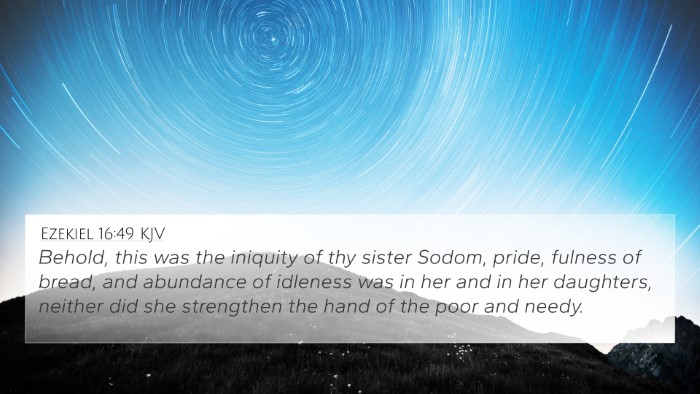Understanding Isaiah 3:16
Verse: "Moreover the LORD saith, Because the daughters of Zion are haughty, and walk with stretched forth necks and wanton eyes, walking and mincing as they go, and making a tinkling with their feet." (Isaiah 3:16)
Overview of Context
In this verse, Isaiah highlights a critical issue within the society of Jerusalem, particularly focusing on the behavior of the daughters of Zion. The prophet is conveying the judgment of God due to their pride and the immorality that manifests in their conduct.
Sum of Commentaries
-
Matthew Henry:
Henry emphasizes the arrogance and ostentation of the daughters of Zion, noting that their haughty demeanor—a combination of pride and sensuality—leads to impending judgment. He analyzes the cultural implications of their behavior, which stands in stark contrast to the humility expected of God's people.
-
Albert Barnes:
Barnes notes the social conditions of Jerusalem at the time, emphasizing that haughtiness among women reflects broader societal decay. He interprets "walking with stretched forth necks" as a symbol of their pride and vanity, which attracts divine rebuke. Barnes further discusses how such attitudes lead to moral corruption within the community.
-
Adam Clarke:
Clarke provides insight into the specific cultural practices of the time, interpreting the 'mincing' walk and 'tinkling' sound as indicative of vain pursuits and a focus on outward appearance. He elaborates on the themes of judgment and the need for the community's repentance, urging a return to humility before God.
Thematic Connections
This verse is rich in themes related to pride, judgment, and the need for humility, echoing across multiple scriptures. Here are some Bible verse cross-references related to Isaiah 3:16:
- Proverbs 16:18: "Pride goes before destruction, and a haughty spirit before a fall." - This verse echoes the themes of pride leading to downfall.
- James 4:6: "But he gives more grace. Therefore it says, 'God opposes the proud but gives grace to the humble.'" - This highlights God's stance against pride.
- 1 Peter 5:5: "Likewise, you who are younger, be subject to the elders. Clothe yourselves, all of you, with humility toward one another, for 'God opposes the proud but gives grace to the humble.'" - A New Testament reinforcement of the principle of humility.
- Micah 6:8: "He has told you, O man, what is good; and what does the Lord require of you but to do justice, love kindness, and walk humbly with your God?" - Emphasizes the importance of humble living.
- Jeremiah 9:23-24: "Let not the wise man boast in his wisdom, let not the mighty man boast in his might, let not the rich man boast in his riches, but let him who boasts boast in this, that he understands and knows me." - Warns against boasting.
- Luke 18:14: "For everyone who exalts himself will be humbled, but the one who humbles himself will be exalted." - Jesus’ teaching reinforces this topic.
- Isaiah 2:12: "For the Lord of hosts has a day against all that is proud and lofty, against all that is lifted up—and it shall be brought low." - Further illustration of God's attitude toward pride.
Interpretive Insights
This verse serves as a profound lesson about the nature of pride and vanity in the face of God's judgment. The prophetic critique signifies a larger pattern found throughout Scripture where connections between Bible verses provide deeper insights into God's expectations for humility and righteousness.
Cross-Referencing Biblical Texts
By employing the idea of scriptural cross-referencing, we can understand that these various themes of pride, judgment, and humility are not isolated teachings but part of a unified biblical message. Understanding Isaiah 3:16 becomes more profound when we compare it with parallel verses.
Tools for Bible Cross-Referencing
Utilizing resources such as a Bible concordance or a Bible reference guide can aid in identifying and analyzing these cross-references more thoroughly. These tools enhance cross-referencing Bible study, facilitate thematic explorations of the text, and encourage deeper engagement with scriptural principles.
Conclusion
Isaiah 3:16 serves as both a warning and an invitation to heed God's call for humility amidst societal decay. The teachings in this verse resonate throughout the Bible, revealing the interconnected nature of God's word and the continued relevance of its messages across generations. Engaging in comparative Bible verse analysis and inter-Biblical dialogue enriches our understanding and allows us to apply these timeless principles to our lives today.














